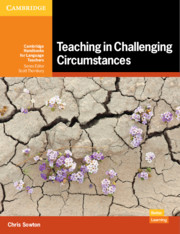Book contents
- Frontmatter
- Contents
- Thanks
- Acknowledgements
- Introduction
- I Creating a good environment for language learning
- II Being effective in the classroom
- III Teaching large classes
- IV Teaching language skills and systems
- V Teaching language without textbooks
- VI Teaching language with textbooks
- VII Helping students achieve their potential
- VIII Linking the school to the outside world
- IX Supporting yourself and others
- Glossary
- Index
28 - Involving the local community
Published online by Cambridge University Press: 22 September 2021
- Frontmatter
- Contents
- Thanks
- Acknowledgements
- Introduction
- I Creating a good environment for language learning
- II Being effective in the classroom
- III Teaching large classes
- IV Teaching language skills and systems
- V Teaching language without textbooks
- VI Teaching language with textbooks
- VII Helping students achieve their potential
- VIII Linking the school to the outside world
- IX Supporting yourself and others
- Glossary
- Index
Summary
The real challenge in resource-starved environments is to determine what the local community and society in general want from schools and then determine the most cost-effective inputs to create such effective schools.
Martin PrewThe short version
1 The involvement of the local community in the school can have a positive impact on student experiences and outcomes.
2 When the local community is more deeply involved in education, students have a richer learning experience, and marginalization is reduced.
3 Some local communities may not know or feel comfortable about being involved in the school. It such cases, it's necessary to make them feel welcome.
4 In every community there are people who have knowledge, skills and experience which can be used for language learning purposes.
5 There are many ways in which the local community can get involved – informal or formal, active or passive, long-term or short-term.
Introduction
1 To what extent is the local community active in your school?
2 Is it important for the local community to be involved in the school? Why / why not?
Why involve the local community?
Involving the local community in your school can have many benefits, such as:
• reducing marginalization;
• increasing inclusivity;
• improving school management;
• providing richer learning experiences for children;
• upholding local culture, tradition, knowledge and skills.
Participation can mean many different things, ranging from passive attendance at events, through to actual legal, statutory powers about what happens in the school.
Open days
An effective way to get the local community involved in your school is to hold an open day. Choose a day when most people will be free, and invite the local community to come to the school, where they can learn more about how it works, and how they could get involved. Organizing an open day should be a collaboration between students, teachers, parents and guardians, and school management.
Questions to ask when planning include:
• What do you want the local community to know about the school?
• What activities could you do to demonstrate the positive aspects of the school?
• How do you want the community to get involved?
- Type
- Chapter
- Information
- Teaching in Challenging Circumstances , pp. 167 - 171Publisher: Cambridge University PressPrint publication year: 2021



